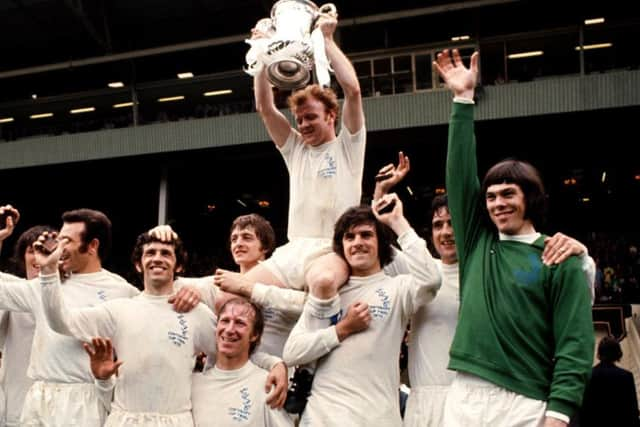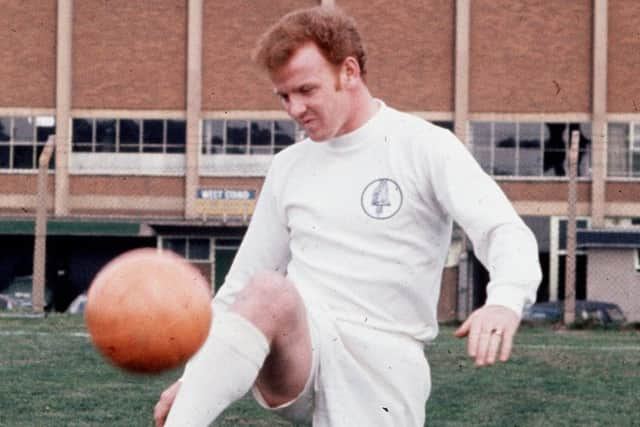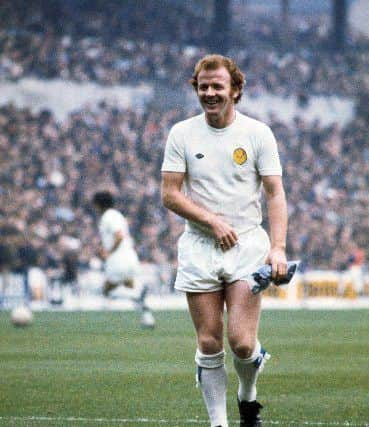Passing years cannot diminish brilliance of Leeds United icon Bremner
and live on Freeview channel 276
William John Bremner’s hometown bordered the battlefield of Bannockburn - the scene of Scotland’s most famous victory - and his warrior spirit, leadership and loyalty to his followers, in a less life ordinary, stood him out from the crowd in his epic tour of duty with Leeds at home and abroad.
The ethos of Bremner, whose untimely passing occurred 20 years ago this week, was embodied in the message just above his dressing room peg in his playing days at Elland Road. It simply read: ‘Keep Fighting.’
Advertisement
Hide AdAdvertisement
Hide AdThe man famously described by The Sunday Times as ‘ten stone of barbed wire’ did exactly that and a fair bit more besides. A leader, winner and a fighter for 17 years in the colours of Leeds and an indomitable presence in one of British football’s greatest-ever club sides.
Idolized by Whites followers, Bremner was also viewed reverentially by Doncaster Rovers supporters after two stints managing the South Yorkshire outfit, who were his other White Rose footballing love.
Bremner made his home on the outskirts of Doncaster with his family for a good number of years, with the great and the good of the footballing world flocking to St Mary’s Church in the pit village of Edlington to pay their last respects at his funeral in December 1997.
Indeed, so many people wanted to be there that the service had to be relayed over loud speakers to the throng outside, such was the standing of one of British football’s great midfielders, who passed away just two days short of his 55th birthday.
Advertisement
Hide AdAdvertisement
Hide AdA formidable opponent whether wearing the white of Leeds or navy blue of Scotland, Bremner had the full respect of his adversaries, who all wished they had ‘wee Billy’ in their line-up. A player who was as tough as they come and blessed with midfield class in abundance.


The succinct words of one of the finest sporting wordsmiths in John Arlott eloquently conveyed that message, with the revered former Guardian writer stating, with total certainty: “If every manager in Britain were given his choice of any one player to add to his team some, no doubt, would toy with the idea of George Best; but the realists, to a man, would have Bremner.”
Anyone who harboured further doubts would also have the view of several of Bremner’s rivals to assist in making their minds up.
It was perhaps Liverpool’s own ‘colossus’ in Ron Yeats, an imposing figure who locked horns on countless occasions with his Tartan compatriot in the sixties, who summed up the standing of Bremner better than most.
Advertisement
Hide AdAdvertisement
Hide AdYeats commented: “I’ll never forget a picture of the two of us tossing up before a big game at Anfield. I was 6ft 3in and Billy was about 5ft 3in. We looked like Little and Large.


“But although he was only a wee man, he was a heavyweight player. He had the heart of a lion and he was a tremendous leader. He never gave up.
“He was an inspiration and he led by example. He expected the whole team to follow and they did.”
Indeed, they did, during a golden era from the mid-sixties to the mid-seventies when Leeds were widely viewed as the best team in the land.
Advertisement
Hide AdAdvertisement
Hide AdFamously, the diminutive flame-haired Scot was rejected by Arsenal and Chelsea for being too small before joining Leeds in December 1959 – with it representing perhaps one of the gravest misjudgements ever by the London duo.


After progressing through Leeds juniors, the Scottish schoolboy international made his first-team debut at Stamford Bridge on January 23, 1960, featuring at outside right, under the careful guardianship of his captain and initial mentor, Don Revie, who played at inside-right.
It was the start of one of the most feted associations in British football, with Bremner becoming a permanent fixture on the Leeds’ team sheet for well over a decade and a half.
Moved to central midfield, Bremner was the heartbeat of Leeds’ march to success in the early to mid-1960s under the command of Revie, installed as manager in March 1961.
Advertisement
Hide AdAdvertisement
Hide AdLeeds won the second Division title in the 1963-64 season and then the following year came tantalisingly close to a “double” of League championship and FA Cup, losing the league to Manchester United on goal average and going down 2-1 after extra-time in the FA Cup final against Liverpool.
It was Bremner who scored the equaliser in normal time, having previously scored with a dramatic late, headed winner in a semi-final replay against Manchester United at Nottingham Forest’s City Ground to take Leeds to their first-ever FA Cup showpiece.
The captain’s armband later arrived towards the back end of 1965, shortly after Bremner’s midfield cohort Bobby Collins saw his thigh broken in a horrific tackle in an Inter Cities Fairs Cup game at Torino.


Bremner would go on to lead out Leeds until his departure for Hull City in September 1976.
Advertisement
Hide AdAdvertisement
Hide AdLeeds won the League Cup and Fairs Cup in 1968 and the Division One title in 1968-69 – a season when United only lost two games and broke all kinds of records, with Bremner at the epicentre, much like he was during a remarkable 1969-70 campaign when he won the 1970 Footballer of the Year award.
But, you sense, he would have gladly traded it in for silverware with Leeds agonisingly missing out on a historic League, FA Cup and European Cup treble.
More trophies did arrive –including another Fairs Cup triumph, a famous FA Cup win in the centenary final of 1972 and a second top-flight title in a peerless 1973-74 season.
Yet the one prize that Bremner and Leeds truly coveted – and merited – was denied them on a hugely controversial night in Paris in May 1975.
Advertisement
Hide AdAdvertisement
Hide AdStill, the memories of Bremner in his pomp pervade above all, his axis with Johnny Giles being one of the great midfield partnerships.
After clocking up 772 appearances for Leeds, putting him marginally second behind Jack Charlton in the club’s all-time list, Bremner – after a two year stint at Hull City – became manager of Doncaster Rovers, with his first stint remembered particularly fondly by Rovers supporters.
The Snodin brothers – Ian and Glynn – were successfully nurtured by Bremner, who orchestrated promotion to the third division for Rovers in 1980-81 and 1983-84, while memorably taking the club to the fourth round of the FA Cup in 1984-85, when they bowed out to winners Everton after beating top-flight QPR in round three.
But the lure of a return to Leeds proved irresistible in October 1985, although Bremner’s time in charge proved bittersweet, with it being a case of so near yet so far with the Whites bowing out of the FA Cup at the semi-final stage in the spring of 1987 and heartbreakingly losing the play-off final replay to Charlton at St Andrew’s.
Advertisement
Hide AdAdvertisement
Hide AdA second spell at Rovers beckoned in the late 80s and early 90s before Bremner embarked on a successful career on the after-dinner circuit – with the world of football shocked by his tragic passing at the age of just 54 on December 7, 1997.
God bless, King Billy.